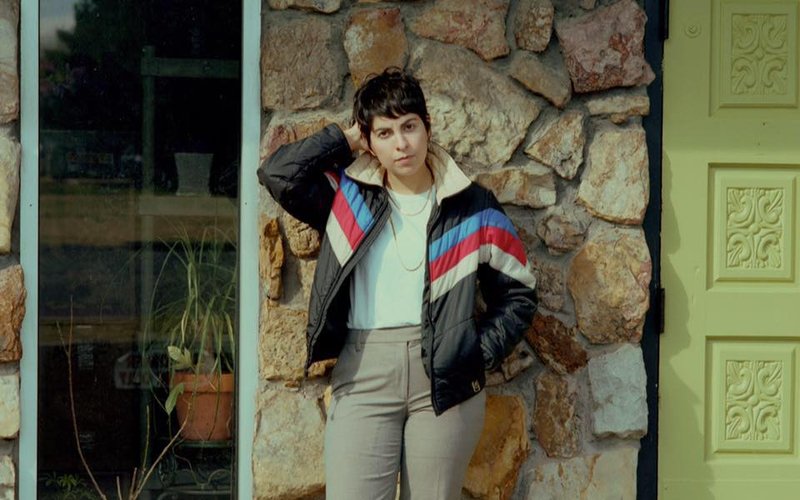
KEXP's Sound & Vision airs every Saturday morning from 7-9 AM PT, featuring interviews, artistry, commentary, insight, and conversation to that tell broader stories through music, and illustrate why music and art matter. You can also hear more stories in the new Sound & Vision Podcast. New episodes are out every Tuesday. Subscribe now.
The southern United States is considered to be the conservative bible belt of the country. It’s also home to the highest percentage of LGBT people in the U.S.
This is a statistic bluegrass musician Justin Hiltner is well aware of.
“Thirty five percent of LGBTQ folks in this country live in the southeast of the United States and in Appalachia,” Hiltner says. “A lot of people don't realize that, especially given the overarching narratives of queerness that we’re given by the media.”
Hiltner grew up in the foothills of the Appalachian Mountains in Ohio and now lives in Nashville, TN. He grew up in a conservative Christian family and homeschooled for faith reasons. He says music was the only thing that got him out of the house.
“Figuratively and literally, it was just getting me out of Licking County, Ohio,” Hiltner says. “That’s when I started to have relationships with people who didn't come from the same background as me.”
Hiltner started playing the banjo at age 6. However, as a teenager, he realized that banjo cornered him into bluegrass. Later, he was unsure of his future as a career banjo player as bluegrass isn’t typically a space for gay people.
“Part of that is just thinking being gay kind of naturally precludes me from being in this space,” he says.
Hiltner has gone on to become the first openly gay man to be nominated for an award by the International Bluegrass Music Association. He says LGBTQ representation in bluegrass is important — especially considering there are so many LGBTQ folks who live in the region where most bluegrass is made.
“We’re reminding folks, we exist and we exist here in these places that everybody kind of forgets that we do,” Hiltner says.
Amythyst Kiah of the supergroup Our Native Daughters, is a gay woman who grew up in East Tennessee. She says “there are so many gay people” in the south.
Kiah says music has a way to transcend boundaries and connect to folks no matter their sexuality, race, or background. She saw that first-hand while on tour in the U.K.
“After the show, this middle-aged white English woman came up to me and she said, I know that you're a young gay black woman from America and I'm an old white woman from England. But I heard and felt and related to every single song that you sang,” Kiah says.
Becca Mancari is a queer singer/songwriter who lives in Nashville. She was born in New York but eventually moved to Florida and Charlottesville, VA as a teen and young adult. It was in Virginia when she got inspiration to write music for the first time.
“The South, just like as a writer, I don't know if you could find a better place filled with ghosts and full with the human experience,” Mancari says.
The south and sexuality weave subtly into Mancari’s music. Her songs have inspired other LGTBQ folks, like when Mancari performed a show in Mississippi and mentioned a story about her girlfriend.
“I saw people walk away. I saw heads shake. And then I saw some kids who were just like, ‘oh, my God, I can't believe she said that,’ in a good way. And then one of the girls who was working as a stage crew literally ran up to me after the show and hugged me and just said, 'I just called my girlfriend and I said that girl just told a crowd of Mississippi folk that she was a gay woman. I can't believe she just did that. Than you so much.’” Mancari says. “I’ve had kids come up to me and say, 'your record helped me come out. Your record helped me get through coming out and my parents rejecting me.'”
Mancari says she’s seen some pretty diverse crowds at her shows and seen very different people bonding through the music together no matter their background or sexuality.
“I'll have like a 50 year old white straight male in the audience who's a big fan. And then I have a pretty great queer audience of younger women and non-binary. And so it's pretty interesting to see who's standing and saying the songs are right beside each other,” Mancari says. “For some reason the music seems to speak to a broader audience.”
At the end of the day, the south is a much more diverse place than many might think. More and more we’re seeing musicians from the south becoming open about their sexuality. Music is a tool for community, and these artists are impacting other marginalized people in the South and across the nation.
KEXP talks to percussionist/producer Sarathy Korwar about his latest release More Coming and how he fuses hip hop and jazz with various elements of the diverse music of India to create something new and vibrant.
KEXP's Cheryl Waters spoke with the Chicago artist about the tracks on her latest album, which were inspired by artists of color like Jean-Michel Basquiat and Octavia Butler.
The recording engineer’s work is highlighted on a new Light in the Attic compilation titled Kearney Barton: Architect of the Northwest Sound.